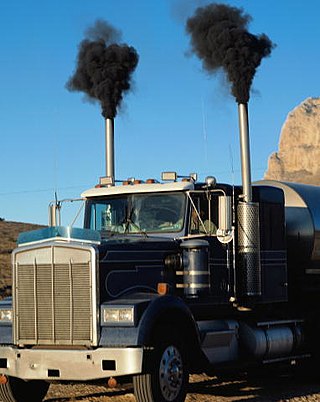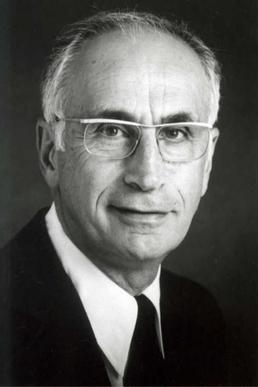Related Research Articles

Ronald Harry Coase was a British economist and author. Coase was educated at the London School of Economics, where he was a member of the faculty until 1951. He was the Clifton R. Musser Professor of Economics at the University of Chicago Law School, where he arrived in 1964 and remained for the rest of his life. He received the Nobel Memorial Prize in Economic Sciences in 1991.

Environmental economics is a sub-field of economics concerned with environmental issues. It has become a widely studied subject due to growing environmental concerns in the twenty-first century. Environmental economics "undertakes theoretical or empirical studies of the economic effects of national or local environmental policies around the world. ... Particular issues include the costs and benefits of alternative environmental policies to deal with air pollution, water quality, toxic substances, solid waste, and global warming."
In economics, the free-rider problem is a type of market failure that occurs when those who benefit from resources, public goods and common pool resources do not pay for them or under-pay. Examples of such goods are public roads or public libraries or other services or utilities of a communal nature. Free riders are a problem for common pool resources because they may overuse it by not paying for the good. Consequently, the common pool resource may be under-produced, overused, or degraded. Additionally, it has been shown that despite evidence that people tend to be cooperative by nature, the presence of free-riders causes cooperation to deteriorate, perpetuating the free-rider problem.

In economics, an externality or external cost is an indirect cost or benefit to an uninvolved third party that arises as an effect of another party's activity. Externalities can be considered as unpriced components that are involved in either consumer or producer market transactions. Air pollution from motor vehicles is one example. The cost of air pollution to society is not paid by either the producers or users of motorized transport to the rest of society. Water pollution from mills and factories is another example. All (water) consumers are made worse off by pollution but are not compensated by the market for this damage. A positive externality is when an individual's consumption in a market increases the well-being of others, but the individual does not charge the third party for the benefit. The third party is essentially getting a free product. An example of this might be the apartment above a bakery receiving some free heat in winter. The people who live in the apartment do not compensate the bakery for this benefit.

In neoclassical economics, market failure is a situation in which the allocation of goods and services by a free market is not Pareto efficient, often leading to a net loss of economic value. The first known use of the term by economists was in 1958, but the concept has been traced back to the Victorian philosopher Henry Sidgwick. Market failures are often associated with public goods, time-inconsistent preferences, information asymmetries, non-competitive markets, principal–agent problems, or externalities.
"The Nature of the Firm" (1937) is an article by Ronald Coase. It offered an economic explanation of why individuals choose to form partnerships, companies, and other business entities rather than trading bilaterally through contracts on a market. The author was awarded the Nobel Memorial Prize in Economic Sciences in 1991 in part due to this paper. Despite the honor, the paper was written when Coase was an undergraduate and he described it later in life as "little more than an undergraduate essay."
In economics, a transaction cost is a cost incurred when making an economic trade when participating in a market.

Law and economics, or economic analysis of law, is the application of microeconomic theory to the analysis of law. The field emerged in the United States during the early 1960s, primarily from the work of scholars from the Chicago school of economics such as Aaron Director, George Stigler, and Ronald Coase. The field uses economics concepts to explain the effects of laws, assess which legal rules are economically efficient, and predict which legal rules will be promulgated. There are two major branches of law and economics; one based on the application of the methods and theories of neoclassical economics to the positive and normative analysis of the law, and a second branch which focuses on an institutional analysis of law and legal institutions, with a broader focus on economic, political, and social outcomes, and overlapping with analyses of the institutions of politics and governance.
In law and economics, the Coase theorem describes the economic efficiency of an economic allocation or outcome in the presence of externalities. The theorem is significant because, if true, the conclusion is that it is possible for private individuals to make choices that can solve the problem of market externalities. The theorem states that if the provision of a good or service results in an externality and trade in that good or service is possible, then bargaining will lead to a Pareto efficient outcome regardless of the initial allocation of property. A key condition for this outcome is that there are sufficiently low transaction costs in the bargaining and exchange process. This 'theorem' is commonly attributed to Nobel Prize laureate Ronald Coase.

Douglass Cecil North was an American economist known for his work in economic history. Along with Robert Fogel, he received the Nobel Memorial Prize in Economic Sciences in 1993. In the words of the Nobel Committee, North and Fogel "renewed research in economic history by applying economic theory and quantitative methods in order to explain economic and institutional change."
Free-market environmentalism argues that the free market, property rights, and tort law provide the best means of preserving the environment, internalizing pollution costs, and conserving resources.

Armen Albert Alchian was an American economist who made major contributions to microeconomic theory and the theory of the firm. He spent almost his entire career at the University of California, Los Angeles (UCLA), and is credited with turning its economics department into one of the country's best. He is also known as one of the founders of new institutional economics, and widely acknowledged for his work on property rights.
Steven Ng-Sheong Cheung is a Hong Kong-born American economist who specializes in the fields of transaction costs and property rights, following the approach of new institutional economics. He achieved his public fame with an economic analysis on China open-door policy after the 1980s. In his studies of economics, he focuses on economic explanation that is based on real world observation. He is also the first to introduce concepts from the Chicago School of Economics, especially price theory, into China. In 2016, Cheung claimed to have written "1,500 articles and 20 books in Chinese" during his academic career.

New Institutional Economics (NIE) is an economic perspective that attempts to extend economics by focusing on the institutions that underlie economic activity and with analysis beyond earlier institutional economics and neoclassical economics.

Property rights are constructs in economics for determining how a resource or economic good is used and owned, which have developed over ancient and modern history, from Abrahamic law to Article 17 of the Universal Declaration of Human Rights. Resources can be owned by individuals, associations, collectives, or governments.
Yoram Barzel was an American-Israeli economist and a professor in the Department of Economics at the University of Washington. He was interested in property rights, applied price theory, and political economy.
"The Problem of Social Cost" (1960) is a law review article by Ronald Coase, then a faculty member at the University of Virginia, dealing with the economic problem of externalities. It draws from a number of English legal cases and statutes to illustrate Coase's belief that legal rules are only justified by reference to a cost–benefit analysis, and that nuisances that are often regarded as being the fault of one party are more symmetric conflicts between the interests of the two parties. If there are sufficiently low costs of doing a transaction, legal rules would be irrelevant to the maximization of production. Because in the real world there are costs of bargaining and information gathering, legal rules are justified to the extent of their ability to allocate rights to the most efficient right-bearer.
DeBoer v. Snyder is a lawsuit that was filed by April DeBoer and Jayne Rowse on January 23, 2012, in the United States District Court for the Eastern District of Michigan, challenging Michigan's ban on adoption by same-sex couples so they can jointly adopt their children. In August 2012, Judge Bernard A. Friedman invited the couple to amend their suit to challenge the state's ban on same-sex marriage, "the underlying issue". Following a hearing on October 16, 2013, Friedman scheduled a trial that ran from February 25 to March 7, 2014. On March 21, Judge Friedman issued his ruling overturning the ban. On March 22, the United States Court of Appeals for the Sixth Circuit placed a temporary hold on Judge Friedman's ruling. The appeal was argued on August 6. On November 6, the Sixth Circuit reversed Judge Friedman and upheld Michigan's ban on same-sex marriage.
Gary Don Libecap is an American economist who is currently an emeritus professor in the Department of Economics and the Bren School at the University of California, Santa Barbara. Libecap’s specialty is environmental economics, and his research focuses on the role of property rights institutions in addressing the open access losses for natural resources such as fisheries and freshwater, as well as the role of water markets in encouraging efficient use and allocation. He has authored or co-authored over 200 peer-reviewed papers, lectured widely, and written articles that have appeared in the New York Times and the Wall Street Journal.
Guoqiang Tian is a Chinese-American economist. He is the Alfred F. Chalk Professor of Economics at Texas A&M University. He is Honorary Dean of Institute for Advanced Research at Shanghai University of Finance and Economics.
References
- ↑ "Douglas Allen wins award for The Institutional Revolution". News. Simon Fraser University. 2 September 2014. Retrieved 4 June 2017.
- ↑ "Douglas W. Allen Resume" (PDF). Retrieved 4 June 2017.
- ↑ Allen, Douglas (Fall 1991). What Are Transaction Costs? (PDF). Research in Law and Economics. Vol. 14. JAI Press. pp. 1–18. ISBN 1-55938-404-2.
- ↑ Editorial Board (6 April 2014). "A mom and a dad". Deseret News. Archived from the original on April 8, 2014. Retrieved 4 June 2017.
- ↑ Allen, Douglas (2013). "High School Graduation Rates Among Children of Same-Sex Households". Review of Economics of the Household. 11 (4): 635–658. doi:10.1007/s11150-013-9220-y. S2CID 35760538.
- ↑ Allen, Douglas; et al. (June 2013). "Nontraditional Families and Childhood Progress Through School: A Comment on Rosenfeld". Demography. 50 (3): 955–961. doi: 10.1007/s13524-012-0169-x . PMID 23161454. S2CID 36353022.
- ↑ Gates, Gary J. (2015). "Marriage and Family: LGBT Individuals and Same-Sex Couples". The Future of Children. 25 (2). Princeton University: 67–87. doi:10.1353/foc.2015.0013. JSTOR 43581973. S2CID 146645073 . Retrieved 2021-12-17.
- ↑ Abbey-Lambertz, Kate (7 March 2014). "Gay People Are Going To Hell, Says Expert Witness In Michigan Gay Marriage Trial". Huffington Post. Retrieved 4 June 2017.
- ↑ Baldas, Tresa (6 March 2014). "Mich. trial witness: Unrepentant gays are going to hell". USA Today. Retrieved 4 June 2017.
- ↑ Hopper, Tristin (28 March 2014). "Canadian economist never knew he would become centre of a U.S. firestorm over his research on same-sex parenting". The National Post. Retrieved 4 June 2017.
- ↑ "Deboer Findings of Fact and Conclusions of Law" (PDF).
- 1 2 "Douglas Allen CV" (PDF).